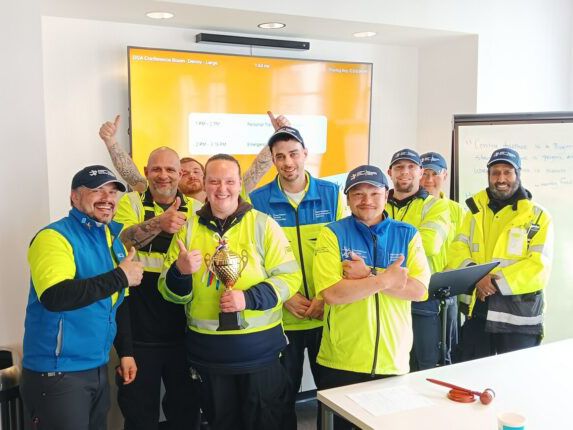News
How DSA/MID’s Personal Transformation Academy is Building Leaders Across Downtown
Posted on

On a recent afternoon along the downtown Seattle waterfront, Metropolitan Improvement District Community Safety & Hospitality ambassador April greeted a pair of tourists studying a map on the phone. Within moments, she had them oriented and on their way, then stopped to check in with a passerby who looked equally disoriented — all with a smile.
For April, these interactions are second nature now. She connects, listens and helps guide residents and visitors alike, commonly giving directions to restaurants, elevators, bathrooms, Pike Place Market and providing water, kindness and care to those in need. April, who was homeless for about 15 years on the same streets where she now works, said her background gives her a unique perspective.
“I love my job because it’s full circle,” she said. “I’m able to help people in the same city where I once needed help myself.”
One of the tools that April credits for building her confidence is Downtown Seattle Association/MID’s Personal Transformation Academy, a 12-week program that began two and a half years ago. Hourlong weekly sessions bring together a handful of MID ambassadors and DSA and Commute Seattle staff — an opportunity to interact with colleagues they seldom would otherwise — who chose to apply for the program. Led by DSA/MID Ambassador Resource Specialist Michael Florez, employees practice communication, public speaking and leadership in these session — skills that ripple outward both personally and to the benefit of DSA/MID.
“PTA is about more than speeches,” Florez said. “It’s about creating a safe space where people can practice being uncomfortable, and discover strength in vulnerability.”
Each week, participants prepare short talks, evaluate one another and take turns leading meetings. They study principles from “The Four Agreements: A Practical Guide to Personal Freedom” and “Toastmasters International,” learning not just how to speak publicly, but how to listen and communicate with empathy.
Sessions are held in DSA’s conference room by design, placing all participants in a professional setting. Body posture is corrected, if necessary, and everyone’s phone is either stashed away or remains face-down on the table. When the program began, it was more crowded and less organized. Today, the number of participants are limited to about six, and just being accepted is a big deal.
The results are tangible. Nearly 90% of those who complete PTA go on to earn promotions within DSA/MID, Florez said, from assistant supervisors to team leads.
“It’s sort of night and day,” said Blake Sundstrom, senior manager of the Community Safety & Hospitality Program. “Before PTA, some candidates would give short answers in interviews, or hold back. Afterward, they’re speaking with confidence and putting themselves out there. It gives them the toolkit to succeed.”
That growth extends beyond job interviews. Sundstrom has seen ambassadors return from PTA with sharper listening skills, stronger teamwork and more empathy in their daily interactions with the public.
“It allows people to provide better customer service out in the field,” he said. “They’re better at communicating with the public, their colleagues and with everyone they encounter downtown.”
Ambassadors like Ashley and Vincent echo that experience. Ashley said PTA made her “more comfortable and confident in myself and what I’m speaking on,” and added that it has transformed the way she carries and presents herself. Vincent described it as “a good opportunity to really build yourself up and your confidence,” adding that he now speaks up more easily at church and community events.
The program’s reach extends beyond ambassadors. DSA Data Specialist Mike Grilli, who helps promote PTA internally, decided to join after seeing Florez’s vision for making it company-wide. For him, confronting social anxiety and the discomfort of public speaking has been a personal milestone.
“Investing in this program sends a clear message: it’s people first, everything else second,” Grilli said. “That might sound idealistic, but I believe it’s the right mindset.”
Following the 12-week course, graduates are recognized by DSA President & CEO Jon Scholes at the organization’s quarterly all-hands team meeting.
For downtown property owners whose MID assessments support the program, PTA represents more than professional development. It’s a direct investment in the people who are downtown every day — cleaning sidewalks, assisting visitors, welcoming workers and serving as the human face of Seattle’s center city.
“When ambassadors believe in themselves, they communicate more effectively, listen more intentionally and serve the public with greater confidence,” Florez said. “That benefits everyone downtown.”
Back at the waterfront, April embodies that transformation. With each question she answers and each interaction she has, she demonstrates the leadership and poise she built in PTA, showing the value of investing in people.
For her, and for many others who’ve graduated from the program, finding their voice has helped make downtown stronger.
“The things we learn in PTA can be applied to everything: work, family, friendships,” she said. “I recommend it to all my coworkers. It’s made me a lot more confident, and that makes me better at helping others.”